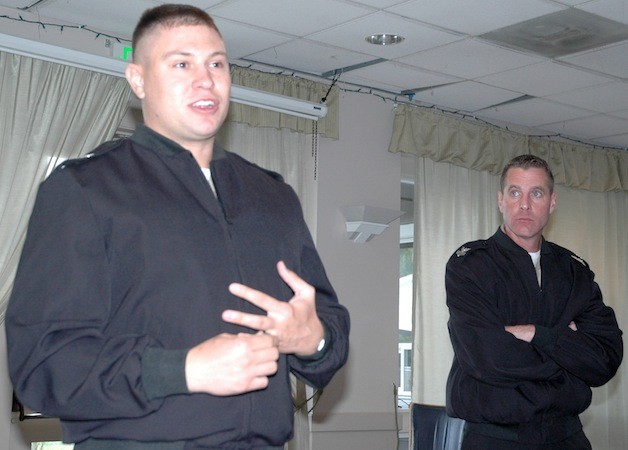ARLINGTON — Two sailors from Naval Station Everett found that their toughest questions came from a room full of fellow veterans.
Fire Controlman 1st Class Gregory Wolf and Information Systems Technician 1st Class Devin Harris still were glad to talk to the Sept. 10 meeting of the ROMEOs, or Retired Old Men Eating Out.
“I’ve had my lunch bought for me three of four dozen times in the year that I’ve served here,” said Wolfe, who’s served 16 years in the fleet and hails from Columbus, Ohio. “It’s the first command I’ve ever served at where I’m thanked daily for what I do. I don’t need a pat on the butt all the time, but it’s nice to be appreciated.”
While Harris has not served at nearly as many commands in his eight years, he echoed Wolf’s gratitude to the local civilians.
Such support is especially heartening for morale as sailors and other service members shoulder additional burdens due to the downsizing of all branches of the military.
While Wolf lamented the loss of some experienced sailors, he noted that the levels of qualifications required by recruiters have increased as a result.
“We’re able to be much more selective in who we accept,” said Wolf, a former recruiter. “We have young people waiting one or two years just to enlist.”
Wolf and Harris pointed out that this has afforded expanded opportunities for women, with more ships carrying both genders and more women being promoted.
“When we look at that pool of qualified candidates, more and more women are performing well in STEM subjects,” Harris said. “We even have female officers on submarines now. They’re really excelling.”
Wolf touted the higher standards that sailors are being held to even in their off-duty hours.
“The old image of the drunken sailor, getting a tattoo on shore leave, is simply not acceptable,” Wolf said. “We still have a good time, but it’s important that we do it responsibly.”
Whether on- or off-duty, the sort of hazing that might have occurred in the old days is no longer tolerated.
“If you engaged in those practices today, it would result in courts-martial, captain’s mast and jail time,” Wolf said.
Wolf emphasized that sexual assault is taken just as seriously.
“We undergo mandatory training, and any allegations are formally investigated,” Wolf said. “It’s a dischargeable offense.”
As the fleet has outsourced certain duties to civilian workers, to bolster the economy and foster a greater sense of partnership with the off-base communities, Wolf and Harris have adjusted their management styles to match the training their young enlisted sailors have received.
“It’s incumbent upon senior leadership to provide more hands-on instruction,” Wolf said. “The best thing you can do is say, ‘Watch what I do.'”
Wolf smirked as he described it as more of a “corporate leadership” style, but he acknowledged that it’s afforded new methods of teaching and performing tasks.
“As we recruit more intelligent young people, they’re more inclined to ask why they’re doing these tasks,” Wolf said. “I often tell them that I’ll explain it to them fully after they’ve done it, but if it’s not related to safety issues, I can throw a problem on the floor and give them the freedom to figure it out on their own.”
Harris elaborated that sailors need to be able to take on more tasks due to the fleet’s smaller numbers, which have also resulted in longer deployments and more of an on-the-ground presence in combat zones.
“Because all the services’ resources are getting extended further, the Navy is putting more boots on the sand as well,” Wolf said. “Our folks are dealing with the same problems of coming home with post-traumatic stress and war wounds as the other services.”
Harris said: “Fatigue becomes more common as our tasks grow greater, but it’s not like we’re not going to do it. We joined to be here to do what needs to be done. We’re committed to our operations.”
Wolf added: “And you guys have been awesome in the support you’ve given to our operations.”
He was especially moved by the community’s response to local sailors’ search and recovery efforts in the wake of the Oso slide.
“Just keep doing what you’re doing,” Wolf said.
The ROMEOs invite members of all walks of the community to speak at their meals. Snohomish County Ombudsman John Koster is set to address the group on Wednesday, Sept. 17, at 10 a.m. at the Gleneagle Golf Course Country Club.







